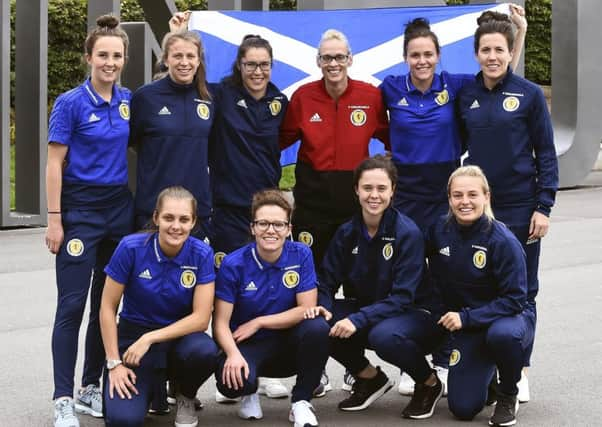Scotland's World Cup place a credit to trailblazer Shelley Kerr


Only nine European nations, including hosts France, qualify for next summer’s finals, which contrasts with the 14 European entrants at this year’s men’s tournament. This underlines the achievement of Kerr’s players in becoming the first Scottish team of either gender to reach a World Cup finals this century.
Scotland beat then-group leaders Switzerland last Thursday to set up Tuesday’s success in Albania and secure a place in France. It was a reward for steady progression, initially under Swedish coach Anna Signeul, who managed Scotland from 2005 to last year. There has also been a boost from events south of the border with the professionalisation of the FA Women’s Super League driving standards up.
Advertisement
Hide AdAdvertisement
Hide AdEleven of the 13 players Kerr used in Albania are full-time pros in England. Of the exceptions, captain Rachel Corsie plays for Utah Royals in America’s National Women’s Soccer League and goalkeeper Lee Alexander plays for Glasgow City. A core group play for the big three clubs of Arsenal, Chelsea and Manchester City. That includes Kim Little, pictured, Emma Mitchell and Jen Beattie, all of whom missed Euro 2017 through injury. In their absence Scotland’s lack of depth was exposed, notably in the 6-0 drubbing by England.
Kerr will pray her key players stay fit as she awaits the draw for the finals on 8 December. Playing Germany would be intriguing as they will be managed by Martina Voss-Tecklenburg who has had to extend her reign as coach of Switzerland after being pipped to qualification by Scotland. The Swiss now enter a daunting four-team play-off for the ninth and final European place with both Euro 2017 finalists, Netherlands and Denmark, and Belgium.
Realistically playing England would again be challenging, not least as their available resources are on a different level.
While Scotland may not be able to provide that level of financial support the positive vibes generated by Tuesday’s success in Shkoder could be even more valuable.
Malky Mackay, the Scottish FA’s performance director, believes Kerr’s side can provide inspiration for their male counterparts as well as aspiring female footballers.
Scotland men’s side have not qualified for the finals of a major tournament since the World Cup in France in 1998.
Following the friendly against Belgium at Hampden Park tomorrow Alex McLeish’s team begin their Nations League campaign against Albania on Monday night with a view to qualifying for the 2020 European Championship and Mackay believes they can look to their female counterparts for encouragement.
“We spoke this morning in terms of the momentum and euphoria that [qualifying] can bring, that feel-good factor,” he said. “There is a lot of young international players in the men’s A squad who have never seen that before because it was 1998. There is something that you can see people grab on to. So, is that something that we can achieve as well?
Advertisement
Hide AdAdvertisement
Hide Ad“There is inspiration for youngsters and inspiration for our boys. There is inspiration for young girls as well. I am so pleased for Shelley, 21 points is a fabulous achievement.
“There is the ability for the young girls to look at that and say, ‘where do we go to local teams to play?’ because there is the inspiration. Go and play for your country and end up in the World Cup.”
Mackay insists the work and investment that has been put into the women’s game in Scotland in recent years and which has increased female participation is bearing fruit.
He said: “There are people who work in the women’s game who have been ploughing away for years and gradually getting more and more funding. We are hoping to have more commercial aspects on the back of the success and our own investment has grown year upon year.
“There are places available for girls to go and quite easily join a team. It has taken a while but we are getting there now.
“Shelley is a big supporter of that, we are both passionate about it.
“There needs to be a pipeline of talent. It can’t be this group and that’s it.
“This is the start of something we are not going to let go, so the younger ones coming through can see a way to go and play top level football.”